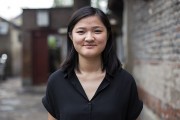It was 3:00 p.m. in Madrid. My plane had landed at 8:00 a.m., but the last students had just arrived. All 26 of us were now here, and I was the only Asian. This was utterly new for me, but allow me to clarify.
I’m from Arcadia, California; it’s Greek for “utopia” which is the perfect description for my city if you’re a homogeneity-seeking Chinese-American family. My parents love this place. The high school I attend is over 70% Asian, the majority being American-born Chinese kids like me. Walking along the streets, you’ll notice Asian people mulling about their business. Nothing out of the ordinary. You’ll say “hello, how are you?” (in ENGLISH); they’ll reply “fine, thanks” (in ENGLISH). Nothing out of the ordinary. Sitting in your Advanced Placement English Language and Composition class, you’ll find yourself surrounded by–you guessed it–Asians. Nothing out of the ordinary. But in the context of the United States (and the world), this is out of the ordinary. After living my entire life in this kind of setting, it has become mundane to me. I don’t expect people to question my ethnic identity because it’s usually the same as theirs.
But when I stepped foot in Madrid for a three-week long study-abroad program, I was stepping foot into unchartered territory. Being the only Asian person in a group was bound to garner me some unwarranted and untrue stereotypes. I wondered: How will this change my own perception of me? It already has, hasn’t it? In Arcadia, I don’t even think twice about what I am…because what I am is what everyone is. But here, I’m…
“Different.”
I spun around to see who’d said it. A blonde girl in aviator sunglasses smiled and replied, “You’re different, but it’s cool.”
Different. That’s the word. Back home, I see “different” in terms of personality traits: shy, extroverted, selfish, altruistic, fake, honest, quick-witted, dull. Those things make people different. And those things take time, conversations, and shared experiences to figure out. But here, my difference from the rest of the group was instantly apparent.
To my pleasant surprise, throughout the next three weeks, the 25 other students and I meshed perfectly. My difference didn’t mean exclusion or alienation, but rather distinction. My new friends thought it was awesome that I could speak Mandarin fluently. They found it amusing when a Spaniard tried to start a conversation with me by saying “Gonichiwa!” They were curious as to what “real Chinese food” was like, and what the best cities to visit in China were. Because of their interest in my heritage, I embraced my Chinese-ness like never before. In Arcadia, even though the majority of my friends share the same heritage, we’re all pretty apathetic towards it. Perhaps it’s because we all share the same heritage. Everyone has it, so why care? No one’s going to ask about it, so why know the details? And that’s the attitude I lived by.
My trip in Spain opened my eyes to the excitement of heritage. I had spent so much time surrounded by people with the same one, I had forgotten about the enormous world out there–a world of difference that I, too, was a part of.
One thing that I will never do is base my entire identity upon my ethnic identity. What I will do, and what I failed to do before, is combine my personality quirks and idiosyncrasies with the backdrop of my heritage. I’m still me; I’ve just discovered that there’s more to me than I thought.







